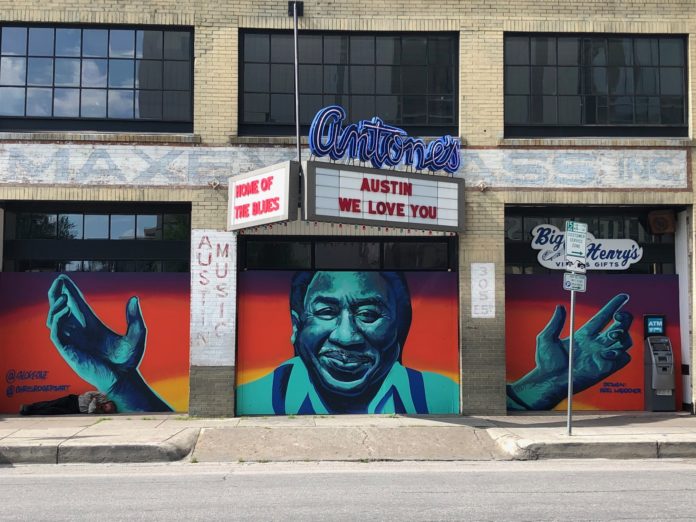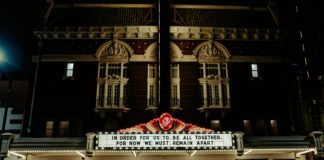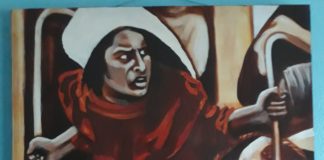It’s time for a New American Dream. In its place, I propose Austin’s ethos.
Needless to say, it’s long been time to renew our collective national aspiration. One could start with the strip-mining of our planet’s environment and resources, the practices that made this pandemic, along with future ones, inevitable. The fuller list demanding a New American Dream is broad and deep: systemic inequality, a broken justice system, the despair of the opioid epidemic, the need to address climate change seriously, just to name a few.
Further self-perpetuating much of this is the ugly way income disparity hives our education system in two. Today, according to philanthropist and hedge fund manager Ray Dalio, those in the top 40 percent of income spend, on average, five times more on their children’s education than those in the bottom 60 percent.
But now, COVID-19 has laid bare the failures of our current national, even global, way of doing things. Our “dream” is in tatters. Almost overnight, we’ve had to reorganize, reshape, and begin rethinking the way our economy works, the way we connect with one another, and the way we sustain our lives, schools, and families.
We don’t know what will change. But we do have a pretty good idea of what cannot stay the same. The world was already accelerating toward a new reality, this new dream if you will, that discards old ways of doing and thinking. But COVID-19 has shifted us into a gear we didn’t know existed.
Austin, I believe, has not just the ability to show the world the way ahead. We also have the obligation to lead. To be clear, Austin has its own welter of failures, from a history of racial segregation with which we’ve yet to come fully to terms, to a deep digital divide in the city, and to a growth model and rising housing costs that threaten, among others, the musicians, artists, and creative people who have helped to make Austin so unique and cherished.
I also realize this may not feel like an inspirational moment, isolated as we all are, with COVID-19 deaths in America now more than 60,000, cases topping 1.1 million, tens of millions more out of work, and all of us, even if we are healthy ourselves, knowing family, friends, or acquaintances who are not. It is a time of great and justifiable fear, with so many unknowns about this virus.
So it’s also a good time to reflect upon the fact that Austin is already in many ways a microcosm of the world to come. We can help the nation and the world thrive beyond the current crisis with the three building blocks of tomorrow that are Austin’s unique reality today. I’ll explain in more detail, but they are what I call positive intentionality, the original ethos of the city rooted in our history; a new kind of entrepreneurialism that acknowledges all stakeholders; and, a robust and fast expanding ecosystem of companies and institutions deeply involved in the making of a new economy and culture based on data and knowledge.
Let me explain what is essentially a taxonomy of interconnecting virtues, one that defines our city. I believe this taxonomy is also a new rough draft of a renewed American Dream:
Positive intentionality: The mystical dimension of Austin is hard to define, but it is nonetheless real. It courses through my veins as a native. I certainly believe in karma for individuals, and it seems to me that Austin has a form of urban karma. It’s more than just the familiar virtues of climate, culture, livability, and a progressive social outlook. It’s more than the city’s heritage of music, with melody and harmony woven into the fabric of the city’s soul. For natives and newcomers alike, the city resonates with a future-focused sense of the possible.
Matthew McConaughey put it well the other day in an interview with Mayor Steve Adler. “We’re not like other cities, Austin” he said. “We don’t have oceans. We don’t have mountains. We don’t have Disney World. But we have each other. It’s all about the amazing people here.” That’s it in a nutshell. It’s not trivial. I was born and raised in Austin. I’m very much a proud product of this great city. I left Austin to earn my MBA at the Wharton School and to start my entrepreneurial dream in Philadelphia and then San Francisco, but I came back to build my businesses here and raise my family here. Everything that is great about Austin flows from this ethos. From our urban karma. This is our positive intentionality.
A new kind of entrepreneurialism: This second building block of the taxonomy only exists because of the first. It grows out of it. Americans are known for their can-do attitude toward life. Texans are certainly proud of their can-do culture. But in Austin we’ve frankly gone beyond that and we have a creation culture. As I wrote in the first chapter of my free online book, The Entrepreneur’s Essentials, “Others dream about it, some write about it, many read about it. But the rare few actually create it.” And we create a great deal, not just in business and technology of course, but also in music at the capital of world-class live music and festivals, in education as home to the University of Texas at Austin and other great centers of learning, and increasingly in beautiful art, filmmaking, and literature.
This creative culture, however, is only half of this entrepreneurial dimension of Austin. The second half of Austin’s entrepreneurialism, more so than even in Silicon Valley, is that we are a global hub of what’s come to be known as “conscious capitalism.” The origin of the term, for companies that fully embrace the needs of all stakeholders – including customers, community, the environment, and not just profits — trace back decades to companies such as Patagonia and later Ben and Jerry’s Ice Cream. But the concept really took off with the publishing of a brilliant book of that name by Whole Foods Market founder John Mackey of Austin and academic Raj Sisoda in 2013. For 13 years now, Austin has been hosting the annual Conscious Capitalism CEO Summit that brings together hundreds of like-minded CEOs from around the world who are interested in making the world and society a better place as part of running successful, profitable businesses. As a leader, it is like a spiritual renewal for me each year.
It’s a movement that has been accelerated with the advent of the so-called “public benefit corporation,” or “B Corporation.” These are companies that actually incorporate a social mission into their corporate mission statement and bylaws, elevating that social mission to a stature alongside the purpose of maximizing shareholder value.
At our company, data.world, for example, our formal mission statement includes the goal of, “Building the most meaningful, collaborative and abundant data resource in the world in order to maximize data’s societal problem-solving utility.” We became a B Corporation in 2016 and joined the effort of then-freshman Rep. Gina Hinojosa of Austin to help make this practice a legal option for any corporation in Texas in 2017. Since then, Austin startups like ZenBusiness, Tso Chinese Delivery, and Osano have joined a movement that now counts more than 5,000 B Corporations nationwide.
At data.world we’ve created the world’s largest collaborative data community for the sharing of public datasets. We can offer this for free to so many community members around the world because of the smaller number of enterprise customers we serve commercially, which allows us to subsidize this social mission for everyone’s benefit. Since the pandemic crisis began, we have ramped up almost overnight to create the “COVID-19 Data Resource Hub.” This hub aggregates, standardizes, and makes available data sets compiled from Johns Hopkins University, both the U.S. and European Centers for Disease Control, the Associated Press, the Harvard Global Health Institute, Austin startup Smarter Sorting, and many others. Scientists, analysts, researchers, businesses, and other institutions all over the world are working together in data.world to track trends, find clues, and share insights that will help us beat this pandemic.
We’re hardly alone.
Other local and global initiatives emanating from Austin include that of SparkCognition, a producer of artificial intelligence, or AI, products that is partnering with Austin design lab Trailside Creative and Dell Technologies to repurpose its operations and make urgently needed face shields and other protective equipment for Austin hospitals. Another team at the UT Cockrell School of Engineering’s Inventionworks lab is using 3D printing technologies for a similar initiative with local companies to mass produce personal protective equipment. Austin Community College has a similar project underway.
Other AI companies are rising to global action in response to the crisis. One, KUNGFU.AI, of Austin, is using its technology to monitor social media for disinformation about the pandemic with a program called AI For Good. Another, ClosedLoop.ai, has launched the C-19 Index, a free survey tool that allows anyone to anonymously compare their own health information with COVID-19 research data and quickly understand in detail their personal risk from infection.
These are just a few of the many examples of recent initiatives related to COVID-19.
I’m proud that data.world is part of this movement that is confronting the pandemic today and also many other global challenges. Soon, I believe, all corporations will strongly consider becoming B Corporations and today’s global pandemic is only hastening this trend. The health and sustainability of the planet depend on it.
Data and the knowledge economy: Just as Austin’s unique history and ethos of positive intentionality is the first building block of the emerging new world, and Austin’s unique “conscious capitalism” is the second building block, the third and final one is the foundation here of the “data and knowledge economy.” Austin’s ecosystem of collaborative innovation, involving UT and a host of startups and mature companies, is really at the very front lines among the pioneers creating the new global economy beyond the pandemic.
The sheer magnitude of the transformation of life around the world by data and digital technologies is of course hard to exaggerate. I don’t see this through rose colored glasses. We now have humanity fully unleashed online in a mostly anonymous fashion, creating such challenges as the polarization of the country, the polarization of the world, the rise of far right movements and populism around the world, and a growing aversion to facts. People who believe the earth is flat can find other people online who also believe something so crazy. And amid this pandemic, conspiracy theories and medical nonsense move at the speed of light.
Austin, though, is doing its part here as well. One company, Yonder, is built upon the discovery of who creates, controls, and amplifies false narratives on the Internet. Other similar initiatives abound in our city. And it’s the Yonders of Austin that are helping others, including data.world, define the upside, the promise of the data and knowledge economy.
Much has been said and written about data as the “new oil.” One measure of data’s eclipse of land, labor, and financial capital, the old classics of capitalism, is the exponential growth of cloud computing. This is a sector that was invented with the creation of Amazon Web Services, or AWS, in 2006. Today, it’s a $330 billion sector, almost three times what it was just in 2017. A study back in 2016 by the Federal Reserve Board of Philadelphia put the total asset value of data in the economy – unrecognized and unrecorded – at close to $8 trillion. To think that we have assets worth more than three times the recent CARES stimulus package and they are not even on the books.
So is data the new oil? Well, data is an unlimited resource, right? We’re not going to run out of it. And, it’s exponentially increasing. So, it’s not like oil in that way. But it is like oil in the way that it is mostly crude, siloed off, and buried deep inside corporations and organizations around the world. It needs to be extracted and refined and molded and shaped into new products and tools and means of learning and interacting.
A lot of organizations have not figured out how to properly account for their data and analyze it. This is the first of what I call the “three silos.” Breaking down the silos of where data is stored to be able to democratize it is what we’re about at data.world. More broadly, Austin’s knowledge ecosystem is about the other two silos, the silos of people and the silos of knowledge. All the work of Austin’s technology companies, and in research labs and companies elsewhere of course, is in one way or another about bringing pools of data together, pools of knowledge together, and groups of people together.
Think of what has been wrought by the response to this pandemic. And think of how different our response would have been were this pandemic to have occurred 20, or even ten years ago.
More than 20 million people watched the Internet-streamed “Together At Home” concert special produced last week by Global Citizen. It raised almost $130 million for the frontline health care workers in the COVID-19 crisis and it was enabled by tools like Zoom that many people had not even heard of two months ago. Education, training, and learning, some of it developed by companies like Austin’s Verb, have gone online literally overnight in ways that yield all manner of new potential and we will never return to the old ways of doing things. Tens of thousands of scientists are collaborating 24/7 around the globe, often among firms that were bitter rivals just weeks ago. Distributed clinical trials of potential new treatments and, even vaccines for COVID-19, are underway as once-paramount concerns on patent rights are simply forgotten amid the urgency of the moment.
All these endeavors are shaping the COVID-19 response today. But tomorrow, they’ll be shaping our quest to accelerate the cure for cancer, to accelerate a cure for climate change, and to accelerate a cure for poverty. Any problem you can imagine, usually has a solution to be found in data.
This is how we will beat this pandemic – and the next one. This is how we will defeat these other global scourges. And this is how we will create a New American Dream. And when we do, Austin, in all its dimensions, will be right there at the forefront with its ethos of positive intentionality, its creative entrepreneurship, and its data and knowledge-creating ecosystem.
I know this, and I believe this, from the bottom of my heart.
If you like what you’ve been reading, please click here to subscribe and we will send you updates and our newsletter.






